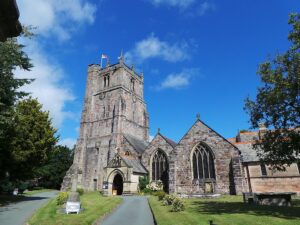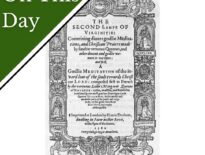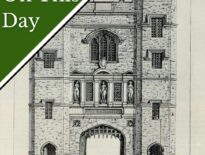On this day in Tudor history, 31st August 1580, in the reign of Queen Elizabeth I, Welsh language poet and elegist Wiliam Llŷn died at Oswestry.
J.C. Morrice, who published a collection of Llŷn's works in 1908, described him as "the best elegist not only of the sixteenth century but, perhaps, of all Welsh bards".
Llŷn left his works to his pupil Rhys Cain, who wrote an elegy to him and recorded that he was not yet forty-six at his death. His other pupil Siôn Phylip also wrote an elegy to him.
Here are some facts about Wiliam Llŷn:
- The surname Llŷn suggests that Wiliam Llŷn's family came from Llŷn in Caernarvonshire.
- His birthdate is unknown but is thought to be around 1534/5.
- Llŷn was married to his wife Elizabeth by 1569 and living in Oswestry. They had a son called Richard and a daughter called Jane.
- Llŷn learnt from poets Gruffudd Dwnn of Ystradmerthyr and Siôn Brwynog of Llanfflewin, and saw Gruffudd Hiraethog as his mentor.
- In 1567, at the national eisteddfod (festival) at Caerwys, Llŷn was recognised as the "pencerdd", chief poet or singer.
- As well as poetry, Llŷn completed works of genealogy, heraldry, history, grammar and astronomy.
- Llŷn composed cywyddau and awdlau, 175 of which still survive today, as well as around 100 englynion.* His poetry included eulogies to churchmen, like the Bishops of St Asaph and St Davids, and local gentry, and elegies to men like his mentor Gruffudd Hiraethog and poets Owain ap Gwilym and Siôn Brwynog. As Brinley Rees notes, two of his elegies were "in the form of a dialogue between the author and the dead man - a style which was quite new at that time."
- He was buried in the parish church at Oswestry.
Also on this day in Tudor history...
Image: St Oswald's Church, Oswestry, resting place of William Llŷn. Photo by Rumpuss53, Wikimedia Commons.
Notes and Sources
*According to Britannica, a cywydd (plural cywyddau) is a "Welsh verse form, a kind of short ode in rhyming couplets in which one rhyme is accented and the other unaccented; each line is composed of seven syllables and contains some form of cynghanedd (a complex system of alliteration and internal rhyme)" and an awdle (plural awdlau) is "a long ode written in cynghanedd (a complex system of alliteration and internal rhyme) and in one or more of the 24 strict bardic metres". An englyn is "a group of strict Welsh poetic metres. The most popular form is the englyn unodl union (“direct monorhyme englyn”), which is a combination of a cywydd, a type of rhyming couplet, and another form and is written in an intricate pattern of alliteration and rhyme called cynghanedd".
- Lake, A. (2004, September 23). Wiliam Llŷn (1534/5–1580), Welsh-language poet. Oxford Dictionary of National Biography. https://www.oxforddnb.com/view/10.1093/ref:odnb/9780198614128.001.0001/odnb-9780198614128-e-21037.
- Rees, B. (2001). WILIAM LLYN (1534 or 1535 - 1580), 'a poet from Llŷn'. Biography Wales. https://biography.wales/article/s-WILI-LLY-1534.




Leave a Reply